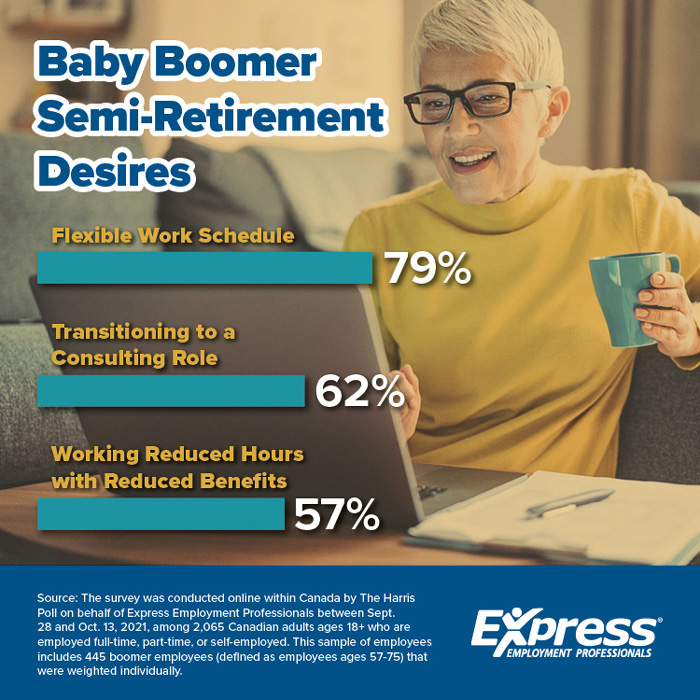Older Workers Want to Stay in Workforce, But Most Employers Don’t Offer Semi-Retirement
TORONTO - January 12, 2022

Semi-Retirement Could Help Ease Labour Shortages but Employers Slow to Adapt
With labour shortages hampering industries across the country, a new survey from The Harris Poll, commissioned by Express Employment Professionals, has found that employers are ignoring an effective option to keep some of their most experienced and knowledgeable employees working.
A majority of Canadian employees say they would partake in semi-retirement, but most companies don't offer the option. As a result, employers are losing employees during one of the worse labour shortages the country has faced in a generation.
More specifically, a majority of employees say they'd be likely to partake in semi-retirement by having a flexible work schedule (79%), transitioning to a consulting role (62%) or working reduced hours with reduced benefits (57%).

However, only around 1 in 5 (22%) say their employer offers semi-retirement.
While few employers formally offer the option of semi-retirement, some employees (43%) say their employer has brought retired employees back, either to be a knowledge expert (21%), act as a mentor to current employees (16%) or handle key client relationships (14%).
More than 3 in 5 (63%) employees wish their company offered more help for transitioning to retirement and only half (51%) report their company has an adequate successor in place for their role when they retire.
The survey results reflect what James Norris, an Express franchise owner in London, Ontario, is experiencing in his area.
"I have not seen companies do enough to bring people back out of retirement," he said. "Companies need to change their ways of thinking and realize that if someone is retirement age they likely do not need to work, and therefore the company has to make it as attractive and stress free as possible."
Hanif Hemani, an Express franchise owner in Saskatoon, Saskatchewan, says labour shortages have caused employers to begin to realize the value of "boomers" and points out that keeping them in the workforce has many benefits for employers.
"This generation of workers has a strong work ethic, they have learned through experience, and they have wisdom," said Hemani. "They have the ability to answer the question 'if I knew then what I know now,' which is a very powerful question to answer in business."
Norris agrees that there are many benefits to keeping older employees.
"Many people who have been in a role for a very long time have found or created efficiencies in their jobs," said Norris. "Not having someone train directly under them to transfer this knowledge could result in years of learned efficiencies being lost."
His advice to companies: identify employees close to retirement and develop succession plans.
"It is becoming more difficult for companies to hire external employees and business leaders need to ensure they have someone in place to learn as much as they can from their seasoned employee before they leave," added Norris. "Not doing so can cause an enormous amount of risk to the business that can be easily mitigated with proper planning, training and development."
In terms of the best way to structure semi-retirement, Hemani and Norris agree that transitioning to consulting roles and offering flexible work schedules are key.
"Transitioning an employee to a consulting role gives the most flexibility to the employee as it can be customized very easily and they also feel like they have more control over their pre-retirement," said Hemani. "Employees who are retirement age likely want to spend more time with family and friends, pursue hobbies and travel, so a flexible work schedule would certainly be desirable to them."
"If someone does not need to work, but the company needs them, then the work schedule has to be on the employees' terms and flexible," added Norris. "By moving workers into a consulting role, they can help train new employees in a reduced labour-intensive capacity, which is key for many individuals who now have difficulty maintaining the more physical duties of the role."
"One day, we will inevitably lose baby boomers entirely from the workforce, but until then, we can all benefit from their talent and skills while offering them the chance to enjoy semi-retirement," Express CEO Bill Stoller said.
Survey Methodology
The survey was conducted online by The Harris Poll on behalf of Express Employment Professionals between Sept. 28 and Oct. 13, 2021, among 2,065 Canadian adults ages 18+ who are employed full-time, part-time, or self-employed. Data were weighted where necessary by age by gender, education, region, household income, household size, and marital status to bring them into line with their actual proportions in the population. This sample of employees includes 445 Boomer employees (defined as employees ages 57-75) that were weighted individually.
###
If you would like to arrange for an interview to discuss this topic, please contact Ana Curic at
(613) 858-2622 or email
Ana@MapleLeafStrategies.com.
About Bill Stoller
William H. "Bill" Stoller is chairman and chief executive officer of Express Employment Professionals. Headquartered in Oklahoma City, Oklahoma, the international staffing company has more than 850 franchises in the U.S., Canada, South Africa, Australia and New Zealand. Since inception, Express has put more than 9 million people to work worldwide.
About Express Employment Professionals
At Express Employment Professionals, we're in the business of people. From job seekers to client companies, Express helps people thrive and businesses grow. Our international network of franchises offers localized staffing solutions to the communities they serve across the U.S., Canada, South Africa, Australia and New Zealand, employing 526,000 people globally in 2020. For more information, visit
www.ExpressPros.com.